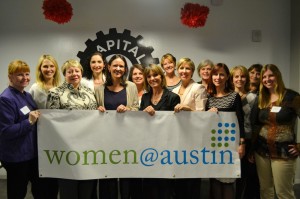
The steering committee behind Women@Austin, photo by Sara Peralta
By LAURA LOREK
Founder of Silicon Hills News
The Capital Factory in downtown Austin smelled like roses and perfume on Thursday night.
Red heart balloons, roses and heart-shaped doilies decorated the tables, walls and windows of the main presentation room.
The tech accelerator and incubator hosted more than 100 women for the inaugural Women@Austin event, which kicked off with networking over wine and hors d’oeuvres. The event sold out in five days, said Jan Ryan, its founder.
“I think we hit a nerve,” she said.
A steering committee of 16 women began meeting last fall to plan for Women@Austin which aims to triple the number of women-funded companies in the next few years, provide more mentoring and increase the visibility of female entrepreneurs in the community.
“This is the debut of a new mission-driven community to really accelerate women in Austin,” Ryan said.
Josh Kerr, co-founder of Written.com, was one of the few men in attendance. He was one of the first ones to sign up, Ryan said.
Usually, Capital Factory is teeming with a lot of men working on startups. Kerr’s company is based there. But on Thursday night, the women took over except for the first speaker, Bill Wood, general partner at Silverton Partners. Laura Kilcrease, founder of Triton Ventures and founding director of the Austin Technology Incubator, introduced Wood. She said he was the first person she met when she moved to Austin in 1984. And he was the first person she consulted when she decided to become a Venture Capitalist and to establish Triton Ventures.
“He gave me insightful information,” Kilcrease said.
Advice from Bill Wood, general partner with Silverton Partners

Bill Wood, general partner of Silverton Partners, photo by Sara Peralta
And Wood provided insightful information about raising venture funds in his talk. Increasing the number of women-backed ventures is something he said he feels very strongly about.
“Women are under-represented and they add such a different dimension,” Wood said. Having women involved in startups leads to better outcomes, he said.
Women have “lifestyle obstacles” but those can be addressed and handled, he said.
Wood gave basic information on the different stages of how startups raise money from friends and family to angels to seed funds and then early stage funds and lastly, growth equity.
“We are a classic seed stage, early stage fund,” he said. “We’re the first institutional investor in our deals, but there are almost always angels where we invest.”
Venture capitalists look for a validation of a product’s market opportunity when they decide to invest in a startup, Wood said. Everything is driven by data and metrics today, he said.
“Business has gone from judgment and insight and wisdom to metric-based decision making.” Wood said. “That’s just the way it works…It’s all math. We’re looking for some validation in the numbers.”
The expectations also go up dramatically when a company gets venture capital, Wood said.
He also said there are lots of great businesses out there that don’t make sense for VCs.
“Don’t get your feelings hurt,” he said. “If you don’t raise VC money, that means you own more of the company. If it’s successful, good for you.”
VCs are looking for outcomes in the $100 million range, Wood said. It’s not just that the business is a really good business, but it has to be able to get to a size where it can provide a big return to investors, he said.
Silverton Partners only invests in Austin companies and most of its investments are in the software industry or consumer applications, Wood said.
Three Female Founders Give Startup Advice

From left – Jan Ryan, Patti Rogers, Heather Brunner and Erica Douglass, photo by Sara Peralta
Following Wood, a panel of three female founders took to the stage to share lessons they learned raising money and running companies. The panel featured Patti Rogers, founder and CEO of Rallyhood, a productivity platform for groups, Heather Brunner, CEO of WPEngine, a WordPress hosting company, and Erica Douglass of MarketVibe, a blog marketing startup.
Ryan asked them what challenges they faced launching their businesses and the lessons they learned.
“When you’re starting something new, every day is a new surprise,” Rogers said. “Having tolerance for that is super important.”
Douglass recounted how Josh Baer, co-founder of Capital Factory, told her that no one cared about her $1 million exit and that she shouldn’t mention that when she pitched investors because they think it’s too small. She cried, she said.
She did go on to raise $640,000 as part of the TechStars Austin program and she’s getting ready to raise another round soon, she said.

Women@Austin, photo by Sara Peralta
“Fundraising is something that takes all your time,” Douglass said. She recommended putting together a list of 125 active investors and spending a month or two just focused on fundraising. It’s important to find out if those investors have written a check in the last year, she said. Austin has a lot of people who say they are investors, but they never write checks, she said.
“You don’t want to waste your time with people who aren’t active investors,” Douglass said.
On the personal side, founders have to get used to rejection, Brunner said.
“Get used to the fact that not everyone is going to love your story,” she said. But make sure to get feedback from them, she said.
Brunner also recommended vetting venture capital firms and investors to find the right fit for a startup’s industry and for those investors who already had investments in that space. That will save time, she said.
She heard from a lot of investors who loved WPEngine’s metrics and were in love with the story, but it didn’t fit their investment metrics, she said.
Ryan also asked the panel how they coped with stress running a startup. Brunner and Rogers do Yoga a couple of times a week and Douglass plays games on her mobile phone with friends.
Lastly, Ryan asked them to give advice to other startup founders.
Rogers said it’s important to really know your story.
“And to continue to refine it and craft it and repeat it and make it better all the time,” she said. “And deliver it with clarity and confidence.”
She also recommended reading Steve Blank’s Startup Manual.
Brunner said it’s important to “know who your hero customer is and find as many of them as possible and talk to them. Make sure you really understand their psyche.”
Douglass told the founders not to opt out. She recommended reading Sheryl Sandberg’s book “Lean In.”

The crowd at the Women@Austin event, photo by Sara Peralta
